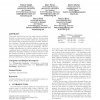Free Online Productivity Tools
i2Speak
i2Symbol
i2OCR
iTex2Img
iWeb2Print
iWeb2Shot
i2Type
iPdf2Split
iPdf2Merge
i2Bopomofo
i2Arabic
i2Style
i2Image
i2PDF
iLatex2Rtf
Sci2ools
GECCO
2008
Springer
2008
Springer
Multiobjective evolution of a fuzzy controller in a sewage treatment plant
This paper describes the use of a multi-objective evolution strategy in tuning a fuzzy controller which is used in sewage treatment plants. The controller adjusts the oxygenation in the aeration tank to support biological processes, which reduce nutrients. Globally optimal settings are unknown and up to now the settings are made by a specialist equipped with a large amount of background knowledge. We successfully approximated the pareto-optimal set of solutions considering given constraints and three objectives using a wastewater simulation software. Evolution was able to find the settings proposed by a human expert as well as an interesting parameter niche, the so called simultaneous intermittent denitrification, which promises energy savings. Categories and Subject Descriptors
GECCO 2008 | Multi-objective Evolution Strategy | Optimal Settings | Optimization | Sewage Treatment Plants |
| Added | 09 Nov 2010 |
| Updated | 09 Nov 2010 |
| Type | Conference |
| Year | 2008 |
| Where | GECCO |
| Authors | Patrick O. Stalph, Marc Ebner, Martin Michel, Bernd Pfaff, Roland Benz |
Comments (0)

